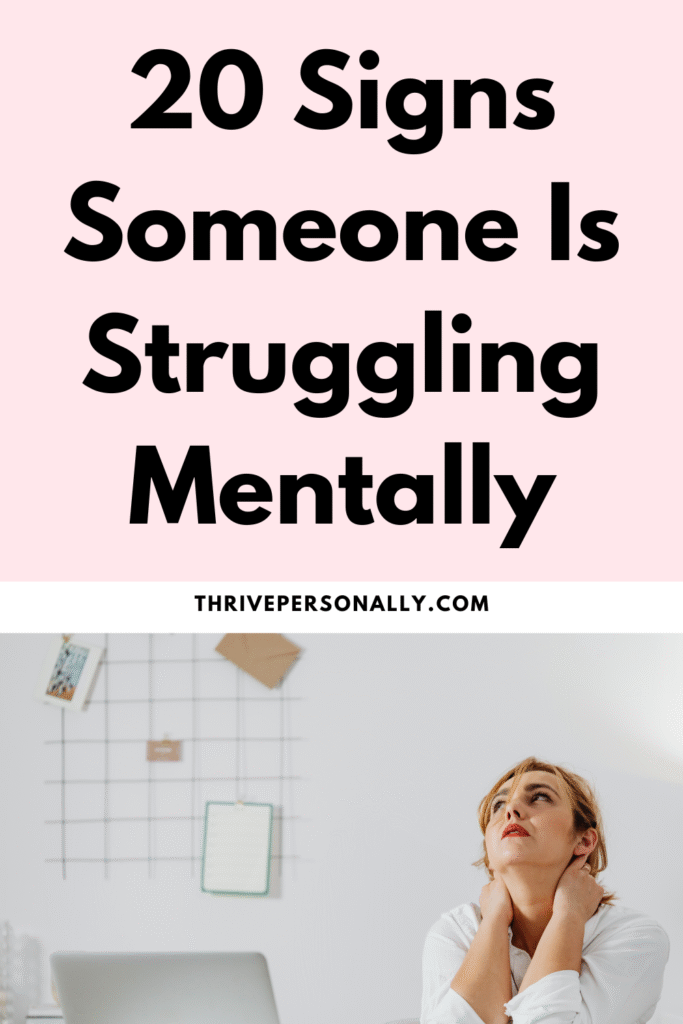Life is full of twists and turns. Everyone goes through hard times, but sometimes, challenges can become so intense that they begin to affect how a person thinks, feels, or behaves. When that happens, it may be a sign that someone is suffering mentally—even if they don’t talk about it or realize it themselves.
That’s why it’s important to know what to look out for. Mental health struggles aren’t always loud. They often show up quietly, in everyday behaviors. Learning to spot these signs can help you support someone in need—or even recognize what you might be going through yourself.
What Mental Health Really Means
Mental health isn’t about being weak or broken. It’s about how well someone can manage life, emotions, stress, and relationships. When someone is mentally struggling, normal tasks can feel overwhelming. Even things they once enjoyed can start to feel like too much.
Changes can be small at first, and they’re not always obvious. But if you begin to see a pattern or several of these signs combined, it’s worth paying attention.
Why Paying Attention to Mental Health Matters
Unlike physical wounds, mental pain is often invisible. People may smile through the day and cry at night. They may seem fine on the outside but be breaking down inside.
According to the World Health Organization, over 280 million people suffer from depression worldwide. Many of them never seek help, often due to fear of being judged or not knowing how to explain what they’re feeling. Similarly, the National Institute of Mental Health states that about 1 in 5 U.S. adults experiences mental illness each year (NIMH data).
This means that someone around you—right now—may be silently struggling.
20 Warning Signs Someone Is Mentally Struggling
These signs may appear slowly or all at once. One or two of them alone might not mean something serious. But if several of them show up together, it could mean the person is having a hard time mentally.
1. They Begin to Withdraw from People
They stop replying to messages, miss appointments, or avoid group chats. It’s not because they don’t care—they’re simply overwhelmed. They might say they’re “just tired” all the time.
Read also: 10 Ways to Improve Your Emotional Intelligence
2. Their Sleep Patterns Change
They may sleep too much or too little. Even after a full night’s rest, they still feel exhausted. Sleep trouble is often one of the first signs of mental distress.
3. Their Eating Habits Shift
They may lose their appetite or start overeating. These shifts in appetite often reflect emotional changes in the background.
Read also: How to Change your Life (10 Ways)
4. They Seem Irritable or Moody
They snap over small things or get angry quickly. It’s not about you—it’s a sign they’re carrying too much inside and it’s showing on the outside.
5. They Talk Less Than Usual
If someone who normally speaks a lot becomes quiet, something may be wrong. Silence often masks emotional pain.
Read also: 8 Effective Ways to Master Your Mind
6. They Seem Lazy or Unmotivated
Hobbies, passions, or daily tasks no longer bring joy. They might say, “I’m just not in the mood” and start neglecting things they used to love.
7. They Struggle to Focus
They become forgetful or lose their train of thought easily. This isn’t laziness—it’s the result of a mind that’s overwhelmed.
8. They Show Physical Signs of Stress
Headaches, stomachaches, or chronic tiredness can show up when the mind is under pressure, even without a clear medical cause.
9. They Speak in Negative Terms
They say things like “Nothing ever goes right” or “What’s the point?” This kind of hopeless thinking can dominate their thoughts.
10. They Apologize Constantly
Frequent apologies, even for tiny things, may reflect deep guilt or feelings of being a burden.
11. They Joke About Dark Things
Humor can be a mask. Jokes about being hopeless, depressed, or even dying might be a subtle way of asking for help.
12. Small Tasks Overwhelm Them
Simple things like getting dressed, cleaning, or running errands feel too hard. Their brain is too tired to push forward.
13. They Avoid Eye Contact
Shame, fear, or sadness might cause them to look away or avoid being “seen.” They may feel exposed or judged when looked at directly.
14. They Feel Empty or Numb
They might say, “I feel nothing,” or “It’s like I’m not here.” Numbness can be even more dangerous than sadness—it signals deep emotional shutdown.
15. They Always Seem “Fine”
Ironically, someone may work, smile, and laugh while hiding everything inside. When “I’m fine” sounds robotic or forced, it could be a red flag.
16. They Express Hopelessness
Phrases like “What’s the use of trying?” or “Nothing ever changes” often signal emotional exhaustion and quiet desperation.
17. They Push People Away
They may ignore messages or become emotionally cold. This isn’t always anger—it may be a form of self-protection or believing they don’t deserve care.
18. They Struggle With Self-Esteem
They talk negatively about themselves, call themselves “losers,” or downplay every achievement. They’ve lost belief in their own worth.
19. They Avoid Making Decisions
They constantly say, “I don’t know,” or ask others to choose for them. Confusion, fear, and mental fatigue can freeze their ability to decide.
20. They Talk About Disappearing
Even if they don’t use the word “suicide,” phrases like “I wish I could disappear,” or “I want to sleep and not wake up” are serious warning signs. Don’t ignore them.
If you hear language like this, take action immediately. In the U.S., you can reach out to the 988 Suicide & Crisis Lifeline—a 24/7 service providing emotional support and crisis help. Learn more at 988lifeline.org.
What You Can Do If You Notice These Signs
You’re not expected to fix anyone. What matters most is simply caring. Let them know you’re there. Ask them how they’re doing. Listen—don’t lecture.
If they seem open, gently suggest speaking to a therapist, counselor, or doctor. Just like we visit doctors for physical health, we sometimes need experts for mental health too.
A good starting point is MentalHealth.gov—a U.S. government resource offering support and direction for those seeking help.
If you are the one experiencing these signs, remember: seeking help is not a weakness. You’re not alone, and you don’t need to hide the pain. Healing begins when you stop suffering in silence.
Final Thoughts
Mental struggles are more common than we think. They don’t always look like someone breaking down. They can appear as small, quiet habits we overlook—missed calls, subtle silences, awkward jokes.
But once you learn the signs, you’ll be better able to see people. And to be seen is often the first step to healing.
So if you notice any of these signs in someone close to you, don’t wait. Reach out. Ask them how they’re doing. Be a safe place. You may not have all the answers, but your presence alone can be life-changing in someone’s darkest hour.
Sometimes, just caring is the strongest support of all.
Save the pin for later



